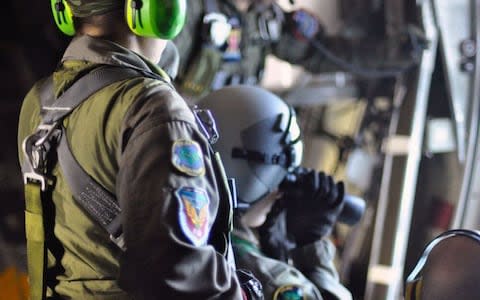Hopes fading for missing Argentinian submarine 'on last day of oxygen'

The search for the Argentine submarine ARA San Juan reached a “critical" point on Wednesday amid fears the 44 crew members could be on their last day of oxygen, as the country’s navy said they had found “no trace” of the missing vessel.
Hopes had briefly been raised on Wednesday morning by reports in Argentine media that a “signal” and a “heat patch” had been detected overnight. But this turned out to be another in a succession of false alarms that have wrought days of cruel disappointment on desperate families.
Britain’s HMS Protector had in fact spotted three flares, Navy spokesman Captain Enrique Balbi reported, and craft equipped with sonar, infra-red and magnetic detection technology had been scrambled to the zone. But a thorough search yielded nothing, he said.
“There was no type of contact with anything supposed to be the submarine,” Captain Balbi explained. There had been no report of a heat patch, he said, only a “sound” quickly dismissed by the vessels that had detected it.
“At the moment we don’t have any trace" of the ARA San Juan, the spokesman said.

He admitted that a week after the submarine’s disappearance following a technical fault, the situation was critical. In the worst case scenario, if the submarine has not been able to surface, its seven-day oxygen supply could now be running out.
“We are continuing with this phase of search and rescue. We are in the critical part, it has reached the seventh day in terms of oxygen, supposing that for seven days it has not had the capacity to go the surface and renew the oxygen. But we are not dismissing the other options, that it could be on the surface.”
More than 4,000 personnel from 12 countries are now scouring the South Atlantic search zone, braving stormy conditions with high winds and waves up to seven metres high. Britain’s HMS Protector is soon to be joined by the HMS Clyde, while the Royal Navy has also dispatched its elite submarine rescue team.
The British contingent has drawn insults from far-Left figures in the country where the dispute over the Falklands remains contentious. Leaders of the Workers’ Party and of radical Left wing group Quebracho branded British forces “pirates” and occupiers on Twitter, but were widely condemned by Argentine users.
Popular anger is instead largely directed at the Argentine authorities for perceived failures in the search effort, and for lack of investment in the armed forces.
The Argentine Navy admitted only on Monday that the ARA San Juan had reported a short-circuit in its batteries before it lost contact. Family members have criticised delays in the search and alleged maintenance failures. On Wednesday a video emerged of President Maurico Macri under fire from relatives who claimed it was “suicide” to deploy a “very old” submarine. Mr Macri insisted that the sub - built in 1985 and renovated completely in 2014 - had been well maintained and that its age “does not matter”.
Yesterday, Elena Alfaro, sister of crew member Cristian David Ibáñez, broke down at the Mar de Plata base as she spoke of her “pain at the decisions that have been taken” and her fears that time was running out. “One cannot believe that it is one’s own country that lets them die.”

